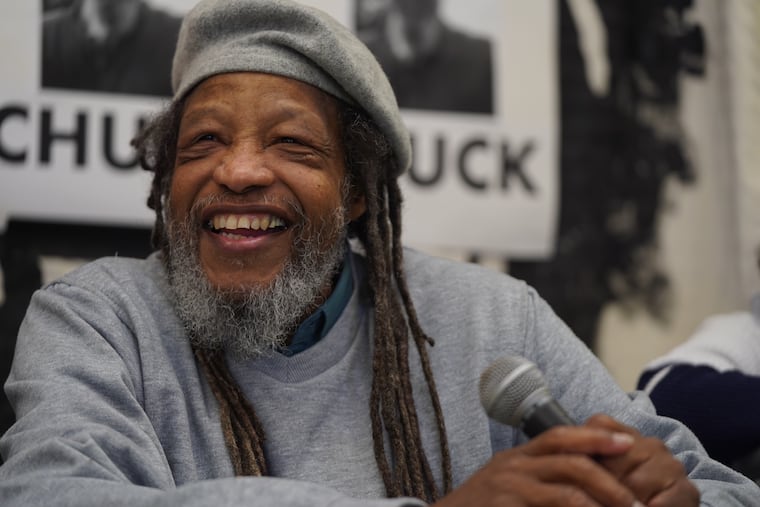Out of prison after 41 years, MOVE member Delbert Africa rails against ‘unjust’ criminal justice system
MOVE member Delbert Africa, who spent nearly 42 years in prison for the murder of a Philadelphia police officer in 1978, holds his first press conference since being paroled on Sunday.

Delbert Africa, a longtime member of MOVE, is unrepentant about his part in the 1978 Powelton Village confrontation between the group and Philadelphia police that left an officer dead and sent him to prison for more than 40 years.
“Nothing could have been done differently to stop and curtail that assault by the police on us. It wouldn’t have stopped,” Africa, 73, said Tuesday in his first Philadelphia interview since being paroled from state prison on Saturday.
One of nine MOVE members imprisoned for the 1978 incident, Africa said he is looking forward to reuniting with the surviving MOVE members who were previously paroled, to continue the work of challenging what he called an unjust criminal justice system. The fact that the city has had African American police commissioners during his time in prison has no bearing on the inequity in the system, he said.
“I want to keep on pushing the whole front of fighting this unjust system. I want to keep on pushing it and do as much as I can in my time here as dictated by the teachings of John Africa. Keep on working, stay on the move,” said Africa, who discussed his past and future goals at a news conference Tuesday at the Kingsessing Branch Library in West Philadelphia.
At the gathering, Africa, his face framed by gray frayed dreadlocks and facial hair, received a hero’s welcome from MOVE members and supporters who listened in rapt attention as he recalled the August confrontation with police, and recounted how he was cursed at and badly beaten by officers after he surrendered.
“I’m unconscious, and that’s when one cop pulled me by the hair across the street, one cop started jumping on my head, one started kicking me in the ribs and beating me," he said. “Their excuse later on is they thought I was armed. I was naked from the waist up.”
Walter Palmer, a University of Pennsylvania history professor who served as chief negotiator for MOVE during the standoff, said his recollection was that the MOVE members were not in a position to have fired on the officer.
“This crime was not the crime of MOVE. It was a crime of the state,” Palmer said during the news conference. “For 40 years, these people spent their life in jail for a crime they did not commit."
Africa said he did not fire a gun during the standoff but was sentenced to 30 to 100 years in prison because of his affiliation with MOVE, for which he served as minister of confrontation and security. His eight codefendants received the same sentence, although he said they also did not fire guns.
He said the decades behind bars did not break him.
“I’ve been made stronger by the incarceration because of that God force that sustained me throughout the years and made me stronger in my beliefs and understanding that this system is wrong, unjust and racist," he said. "And the way to change it is not only to point the finger at you or anybody else, but to point the finger at myself.”
MOVE was created in 1972 by West Philadelphia native Vincent Leaphart, who called himself John Africa and preached an ideology centered on black revolutionary ideas and back-to-nature philosophies. The dozens of members considered MOVE their religion, adopting anti-technology and anti-government beliefs while taking on issues ranging from police brutality to animal rights.
In 1977, a federal grand jury indicted 11 MOVE members on bomb-plot charges after an arsenal of weapons, including 49 pipe bombs and parts, was seized from the group. A year later, the city created an eviction order that sent police to raid MOVE’s Powelton Village home.
Firefighters flushed the house with fire hoses, and police violently removed people. In the end, one shot killed Officer James Ramp. Eighteen police officers and firefighters were hurt.
MOVE has always maintained that the bullet that killed Ramp was accidentally fired by police.
By 1980, the group had relocated to the 6200 block of Osage Avenue. Neighbors began to complain to the city about trash, loudspeaker rants, and concerns about child abuse and neglect in MOVE’s house.
On May 13, 1985, the city flew a helicopter over the group’s home and dropped the bomb that left 11 people dead, including John Africa, as well as Delbert Africa’s 13-year-old daughter. The neighborhood was in ruins, with 61 homes destroyed. City officials were found to have acted recklessly, but no charges were filed.
Delbert Africa was among nine MOVE members convicted of third-degree murder for Ramp’s death.
Janine, Janet, and Eddie Africa were released from prison in 2019. Mike Africa Sr. and his wife, Debbie, were released in 2018. Merle Africa died in prison in March 1998 and Phil Africa died in prison in January 2015. Chuck Africa remains imprisoned.